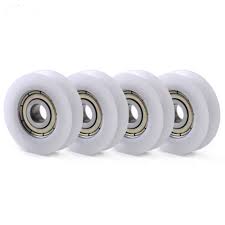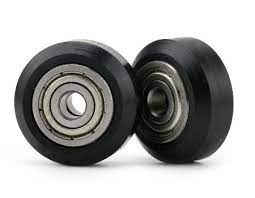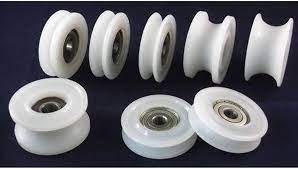Product Description
Detailed Photos:
Company Profile:
CHINAMFG was set up in 1996 and located at HangZhou, a beautiful city in China. Our company is bearing manufacturer&bearing distributor. Since it was first established, CHINAMFG was dedicated in research, development and manufacture of bearings. Now, CHINAMFG has become main and 1 of the first grade suppliers of all kinds of bearings.
WELCOME TO THE CLUB!
Packing&Shipping:
FAQ:
1. who are we?
We are based in ZheJiang , China, start from 2017,sell to North America(1.00%),Africa(1.00%),Western Europe(1.00%),Southern Europe(1.00%). There are total about 51-100 people in our office.
2. how can we guarantee quality?
Always a pre-production sample before mass production;
Always final Inspection before shipment;
3.what can you buy from us?
Bearing cage,Bearing pulley,Plastic producs,Miniature bearing,Needle roller bearing
4. why should you buy from us not from other suppliers?
Hardware pulley source factory,20 years professional bearing pulley experience
5. what services can we provide?
Accepted Delivery Terms: FOB,CFR,CIF,EXW;
Accepted Payment Currency:USD,EUR,JPY,CNY;
Accepted Payment Type: T/T,L/C,D/P D/A;
Language Spoken:English,Chinese,Spanish,Japanese,French,Italian /* January 22, 2571 19:08:37 */!function(){function s(e,r){var a,o={};try{e&&e.split(“,”).forEach(function(e,t){e&&(a=e.match(/(.*?):(.*)$/))&&1
| Aligning: | Aligning Bearing |
|---|---|
| Separated: | Unseparated |
| Rows Number: | Single |
| Samples: |
US$ 0.5/Piece
1 Piece(Min.Order) | Order Sample |
|---|
| Customization: |
Available
| Customized Request |
|---|
.shipping-cost-tm .tm-status-off{background: none;padding:0;color: #1470cc}
|
Shipping Cost:
Estimated freight per unit. |
about shipping cost and estimated delivery time. |
|---|
| Payment Method: |
|
|---|---|
|
Initial Payment Full Payment |
| Currency: | US$ |
|---|
| Return&refunds: | You can apply for a refund up to 30 days after receipt of the products. |
|---|
How do plastic pulleys contribute to the functioning of exercise and gym equipment?
Plastic pulleys play a significant role in the functioning of exercise and gym equipment. Here’s a detailed explanation:
1. Cable and Pulley Systems:
Many exercise machines, such as cable machines or functional trainers, utilize cable and pulley systems for resistance training. Plastic pulleys are an integral part of these systems as they guide and redirect the cables, allowing users to perform various exercises. The smooth rotation of plastic pulleys ensures consistent and friction-free movement of the cables, enabling users to engage in resistance training with controlled and targeted muscle activation.
2. Adjustable Resistance:
Plastic pulleys contribute to the adjustable resistance feature in gym equipment. By incorporating pulleys with different diameters or sizes, equipment manufacturers can vary the mechanical advantage and resistance experienced by users. Adjusting the position of the cable on different pulleys alters the resistance profile, providing users with a wide range of resistance levels to cater to their fitness goals and capabilities.
3. Smooth and Controlled Movements:
Plastic pulleys facilitate smooth and controlled movements during exercise routines. They offer low friction and excellent rotational capabilities, ensuring that the cables move freely and without jerks or interruptions. This smoothness allows users to perform exercises with proper form, reducing the risk of injury and providing a more comfortable workout experience.
4. Multiple Exercise Options:
Plastic pulleys enable the versatility of exercise and gym equipment by providing multiple exercise options. Gym machines equipped with pulley systems offer a wide range of exercises that target different muscle groups. Users can perform exercises such as chest presses, lat pulldowns, cable curls, and many more, all made possible by the smooth operation and flexibility of plastic pulleys.
5. Durability and Low Maintenance:
Plastic pulleys are known for their durability and low maintenance requirements. They are resistant to corrosion, wear, and impact, making them suitable for the demanding environment of gym equipment. Plastic pulleys require minimal lubrication and can withstand the repetitive and high-intensity movements associated with exercise machines. Their long-lasting nature reduces the need for frequent replacements and ensures consistent performance over time.
6. Noise Reduction:
Plastic pulleys contribute to noise reduction in exercise and gym equipment. The smooth rotation and low friction of plastic pulleys help minimize noise generated during the operation of cable and pulley systems. This is particularly important in commercial gyms or home environments where a quiet workout atmosphere is desired.
7. Portability and Lightweight Design:
In the case of portable exercise equipment or machines with adjustable features, plastic pulleys offer the advantage of being lightweight. The use of plastic pulleys reduces the overall weight of the equipment, making it easier to transport or move around. This is beneficial for users who prefer to exercise in different locations or need to store the equipment when not in use.
In summary, plastic pulleys are essential components in exercise and gym equipment. They contribute to the smooth operation of cable and pulley systems, enable adjustable resistance, facilitate controlled movements, offer multiple exercise options, provide durability with low maintenance, reduce noise, and offer portability. By incorporating plastic pulleys into their designs, manufacturers can enhance the functionality and user experience of exercise equipment, allowing individuals to engage in effective and versatile workouts for improved fitness and well-being.
Can plastic pulleys be customized for specific machinery and equipment?
Yes, plastic pulleys can be customized to meet the specific requirements of machinery and equipment. Here’s a detailed explanation:
Plastic pulleys offer a high degree of design flexibility, allowing for customization to match the needs of different machinery and equipment. Here are some key points regarding the customization of plastic pulleys:
1. Material Selection:
Plastic pulleys can be manufactured using various types of plastics, such as nylon, polyethylene, acetal (POM), or polyurethane. The choice of material depends on the specific application requirements, including factors like load capacity, wear resistance, chemical resistance, temperature tolerance, and desired friction properties. Different materials can be selected to optimize the performance and durability of the pulley in the given machinery or equipment.
2. Shape and Size:
The shape and size of plastic pulleys can be customized to fit the available space and interface with other components in the machinery or equipment. Manufacturers can design pulleys with specific dimensions, such as diameter, width, and bore size, to ensure proper alignment, belt or chain engagement, and tension. Customized shapes can include flanges, grooves, or other features that facilitate efficient power transmission and enhance the overall functionality of the machinery or equipment.
3. Mounting Options:
Plastic pulleys can be customized with different mounting options to suit the specific requirements of machinery or equipment. Mounting options can include bores, keyways, set screws, or other mechanisms that enable secure attachment to shafts or other rotating components. Customized mounting options ensure proper installation and alignment of the pulleys, contributing to reliable and efficient operation.
4. Groove Configuration:
In belt-driven systems, plastic pulleys can be customized with different groove configurations to accommodate specific belt profiles. Pulleys can be designed with V-grooves, flat grooves, or multi-groove profiles, depending on the type of belt being used. Customized groove configurations ensure optimal belt engagement, tracking, and power transmission, minimizing slippage and maximizing efficiency in the machinery or equipment.
5. Surface Finish:
The surface finish of plastic pulleys can be customized to meet specific requirements. This includes factors such as roughness, texture, or the addition of coatings or treatments. For example, pulley surfaces can be polished or coated to reduce friction, improve wear resistance, or enhance corrosion resistance. Customized surface finishes help optimize the performance and longevity of plastic pulleys in the machinery or equipment.
6. Load Capacity and Reinforcement:
If the machinery or equipment operates under heavy loads or high-stress conditions, plastic pulleys can be customized to enhance their load-carrying capacity. Reinforcing elements, such as fibers or fillers, can be added to the plastic material to increase strength and improve overall durability. Customized reinforcement ensures that the plastic pulleys can withstand the specific loads and forces encountered in the machinery or equipment.
7. Application-Specific Requirements:
Plastic pulleys can be customized to meet application-specific requirements. For example, in food processing equipment, the pulleys may need to comply with specific hygiene standards, such as being made from food-grade materials that are easy to clean. In corrosive environments, the pulleys can be customized to exhibit enhanced chemical resistance. Customization allows plastic pulleys to be tailored to the unique demands of different machinery and equipment.
Overall, plastic pulleys can be customized in terms of material selection, shape and size, mounting options, groove configuration, surface finish, load capacity, and meeting application-specific requirements. This customization ensures that the plastic pulleys seamlessly integrate into the machinery or equipment, providing optimal performance, durability, and reliability in their intended applications.
What is a plastic pulley, and how does it compare to other types of pulleys?
A plastic pulley is a type of pulley made primarily from plastic materials, such as nylon, polyethylene, or polycarbonate. It is designed to perform similar functions as other types of pulleys but offers distinct advantages and considerations. Here’s a detailed comparison of plastic pulleys with other types of pulleys:
1. Material:
Plastic pulleys are specifically engineered to be lightweight and durable. They are resistant to corrosion, moisture, and many chemicals, making them suitable for various environments. In contrast, other types of pulleys, such as metal pulleys, may be heavier and prone to rust or corrosion without proper protection.
2. Cost:
Plastic pulleys tend to be more cost-effective compared to metal pulleys or pulleys made from other materials like ceramic or glass. The manufacturing process for plastic pulleys is generally less expensive, resulting in lower production costs and, consequently, lower prices for consumers.
3. Noise and Vibration:
Plastic pulleys often provide quieter operation compared to metal pulleys. The inherent damping properties of plastic materials help reduce noise and vibration during pulley rotation. This makes plastic pulleys suitable for applications where noise reduction is desired, such as in household appliances or office equipment.
4. Friction and Wear:
Plastic pulleys generally have lower friction coefficients compared to metal pulleys. This can result in reduced wear and tear on the pulley itself and the associated components, such as belts or ropes. However, it’s important to note that the selection of the appropriate plastic material and design considerations are crucial to ensure sufficient strength and wear resistance for the intended application.
5. Load-Bearing Capacity:
While plastic pulleys can handle moderate loads, they may have lower load-bearing capacities compared to metal pulleys. Metal pulleys, especially those made from robust materials like steel or cast iron, are typically stronger and capable of withstanding higher loads. Therefore, in heavy-duty applications or situations where significant forces are involved, metal pulleys may be preferred.
6. Temperature Resistance:
Plastic pulleys have varying temperature resistance depending on the specific material used. Some plastics can withstand a wide temperature range, while others may have limitations. For example, nylon can handle higher temperatures compared to polyethylene. In contrast, metal pulleys generally have higher temperature resistance, making them suitable for high-temperature environments.
7. Application Specificity:
The choice between plastic pulleys and other types of pulleys often depends on the specific application requirements. Plastic pulleys are commonly used in light to moderate load applications, such as in small appliances, office equipment, or recreational devices. Metal pulleys, on the other hand, are often preferred in heavy-duty applications, industrial machinery, or situations where high strength and durability are paramount.
8. Customization:
Plastic pulleys offer flexibility in terms of design and customization options. They can be easily molded into various shapes and sizes, allowing for specific features or geometries to be incorporated. This makes plastic pulleys suitable for applications where precise customization is required. Metal pulleys may require more extensive machining or manufacturing processes for customization.
In conclusion, plastic pulleys offer unique advantages such as lightweight construction, corrosion resistance, cost-effectiveness, noise reduction, and design flexibility. However, they may have limitations in terms of load-bearing capacity and temperature resistance compared to metal pulleys. The choice between plastic pulleys and other types of pulleys depends on factors such as application requirements, load conditions, environmental considerations, and budget constraints.
editor by CX
2024-05-16




